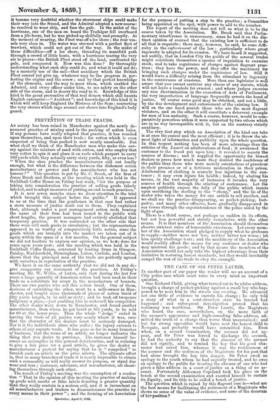THE CASE OF SIR PETER LAURIE.
IN another part of our paper the reader will see an account of a City police case which must raise in every mind an important question. One Richard Child, giving what turned out to be afalse address, brought a charge of pocket-picking against a small boy who hap- pened to be near him in the streets one evening. He advanced not one tittle of evidence to sustain his charge ; he only told a story of what in a semi-drunken state he fancied had happened ; and subsequent investigation proved that his testimony was worthless. Sir Peter Laurie, the Magistrate Who heard the case, nevertheless, on the mere faith of the accuser's appearance and high-sounding false address, ad- mitted the truth of a charge thus worse than unsustained ; and but for strong opposition would have sent the honest child to Newgate, and probably would have committed him. Even when, on a second examination, the accuser did not ap- pear, and Sir Peter was forced! to discharge the accused, he had the audacity to say that the absence of the accuser did not signify, and to remind the boy that his good cha- racter had saved' him, whereas it was the recklessness of the accuser and the unfitness of the Magistrate for his post that had alone brought the boy into danger. Sir Peter owed an apology to the youth whom he had unjustly treated, and he owes an apology to the public for treating the absence of one who had given a false address in a court of justice as a thing of no ac- count. Fortunately Alderman Copeland took his place on the bench at the second examination and exerted himself to sustain its dignity, and its title to be called a bench of justice. The question which is raised by this flagrant case is—what are the best means for facilitating the retirement of a Magistrate who shows no sense of the value of evidence, and none of the decor= of hif-position?


























 Previous page
Previous page